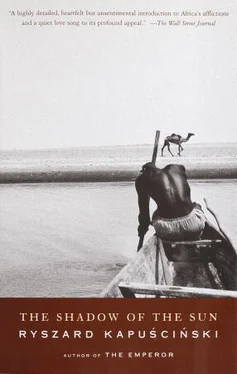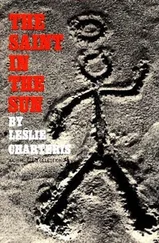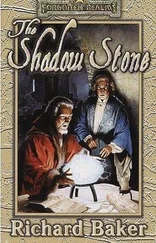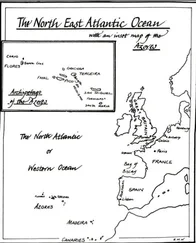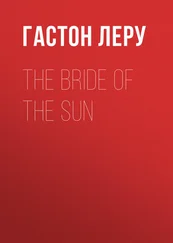I looked around the interior of the temple. It was a spacious, sprawling hall, resembling a great hangar. The walls had wide grilles, so that fresh air could enter and the breeze offer some relief, all the more important given the corrugated tin roof, warmed by the sun. I didn’t notice an altar anywhere. There were also no sculptures or paintings. An orchestra several dozen strong, however, with large brass and percussion sections, stood on an elevated platform near the presbytery, and right behind it, on the uppermost level, a mixed choir dressed in black. The center of the proscenium was occupied by a massive mahogany pulpit.
The priest who now stepped up to it was a graying, heavy Nigerian, perhaps over fifty. He leaned his hands on the edge of the pulpit and looked at the faithful. They had raised themselves by now from their kneeling position and were sitting, watching him attentively.
The proceedings began with the choir singing the fragment of the prophecies of Isaiah in which God announces that he will punish the Egyptians with a great drought:
Behold, the Lord rideth upon a swift cloud and shall come into Egypt: and the idols of Egypt shall be moved…
And the waters shall fail from the sea, and the river shall be wasted and dried up.
And they shall turn the rivers far away; and the brooks of defence shall be emptied and dried up: the reeds and flags shall wither.
The paper reeds by the brooks, by the mouth of the brooks, and every thing sown by the brooks, shall wither, be driven away, and be no more.
The fishers also shall mourn, and all they that cast angle into the brooks shall lament, and they that spread nets upon the waters shall languish.
If the goal was to instill anxiety and dread in the faithful, to evoke the atmosphere of Apocalypse, the text was aptly chosen. For these were local people, from the land upon which the mighty Niger splits into dozens of smaller rivers, into numerous twisting branches and canals, creating Africa’s largest delta. This watery net has given them sustenance for generations, and the biblical vision of drying and disappearing rivers was bound to awaken in those gathered the direst forebodings and fears.
The priest now opened the large Bible bound in red leather, paused for a long while, then started to read:
Moreover the word of the Lord came unto me, saying, Jeremiah, what seest thou? And I said, I see a rod of an almond tree.
He looked at the assembled and continued reading:
And the word of the Lord came unto me the second time, saying, What seest thou? And I said, I see a seething pot…
Thou therefore gird up thy loins, and arise, and speak unto them all that I command thee: be not dismayed at their faces…
He laid the Bible aside and, pointing at the congregation, shouted: “And I am not dismayed at your faces! I did not come here to be afraid of you, but to tell you the truth and to cleanse you!”
From the very first moments of his sermon, from the first words and sentences, he was in high gear, brimming with accusations, anger, irony, and fury. He continued: “Above all else, the Christian must be clean. Internally clean. And are you all clean? Are you clean?” He motioned somewhere toward the back of the hall, but because he didn’t actually single out any one person, a whole group of people standing there cringed guiltily, as if they had been caught in the act.
“And perhaps you consider yourself to be clean?” He moved his finger, pointing at another place in the hall, and now the people standing there cowered and hid their faces in embarrassment.
“No, you are not clean! You have a long way to go before you are clean! None of you are clean!” He said this categorically and almost triumphantly. Just then the orchestra blared, the trumpets, trombones, cornets, and horns roared. They were accompanied by the dull thud of drums and the chaotic moaning of the choir.
“And you probably think that you are Christians!” he exclaimed after a moment, mockingly. “I can swear that is what you think. That you are certain of this. Each one of you walks around, proudly sticking out his chest and announcing: ‘I am a Christian! Look at me, look and admire — now here is a Christian! A true one, so true, there isn’t a truer one in the world!’ That is how you think. I know you well. A Christian! Ha! ha! ha! ha!”—he burst into loud, nervous, scathing laughter, so suggestive that the atmosphere in the hall began to communicate itself to me, and I felt shivers running up and down my spine.
The people stood there bewildered, crestfallen, condemned. Who were they, if they couldn’t be considered Christians? What were they supposed to be, where were they supposed to go? Each of the priest’s utterances brought them lower, reduced them to dust. Standing in the middle of this rapt, emotional, terrified crowd, it would have been unseemly of me to observe them too openly and obviously. It sufficed that I was white; that alone drew attention. But out of the corner of my eye I could see that the women standing next to me had beads of sweat on their brows, and that their hands, which were folded on their breasts, were trembling. Perhaps what they were most fearful of was the priest pointing at any one of them individually, destroying their reputations, denying them the right to call themselves Christians. The priest had enormous, hypnotic power over them, and the authority to mete out the most heartless, severe judgments.
“Do you know what it means to be a Christian?” he asked. The audience, which until now had been standing still, dejected and humbled, stirred, expecting to hear an answer, some advice, a helpful recipe or definition. “Do you know what it means?” he repeated, and one could sense the tension rising among the faithful. But before they were able to hear the reply, the orchestra resounded once again. The tubas, bassoons, and saxophones thundered. Drums beat and rumbled. The priest sat down in an armchair, leaned his head on his hands, and rested. The orchestra fell silent. The priest rose again.
“To be a Christian,” he said, “means to hear within yourself the voice of the Lord. To hear the Lord asking, ‘Jeremiah, what seest thou?’ ”
After the word “Lord,” the congregation started to sing:
Oh, Lord,
You are my Lord,
Oh, yes,
Oh, yes, yes, yes,
Oh, yes,
You are my Lord.
They began rhythmically rocking and undulating, and billows of brick dust rose from the floor. Then everyone sang the psalm “Praise the Lord on loud cymbals…”
The tension diminished somewhat, the mood mellowed, and people loosened up a bit, breathed easier. But only for a brief moment, because soon the priest spoke again:
“But you cannot hear the voice of the Lord. Your ears are plugged up. Your eyes do not see. Because there is sin in them. And sin renders you deaf and blind.”
Absolute silence descended. The only ones now moving in the hall full of people sitting motionless — but moving carefully, almost on tiptoe — were a number of young, strong, well-built men. They wore identical dark suits, white shirts, and black ties. I had counted twenty of them earlier, at the gate leading into the churchyard: they were checking who was arriving. Then, right before the mass, they spread out through the hall and took up positions near the pews, in such a way that each of them could observe a different sector of the temple. Observe, intervene, lead. Their gestures, their whole behavior, were characterized by absolute concentration and decisiveness. No African muddling or lolling about here. On the contrary — efficiency, attentiveness, alacrity. They were in control of the situation, and one sensed that that was their mission.
Читать дальше
